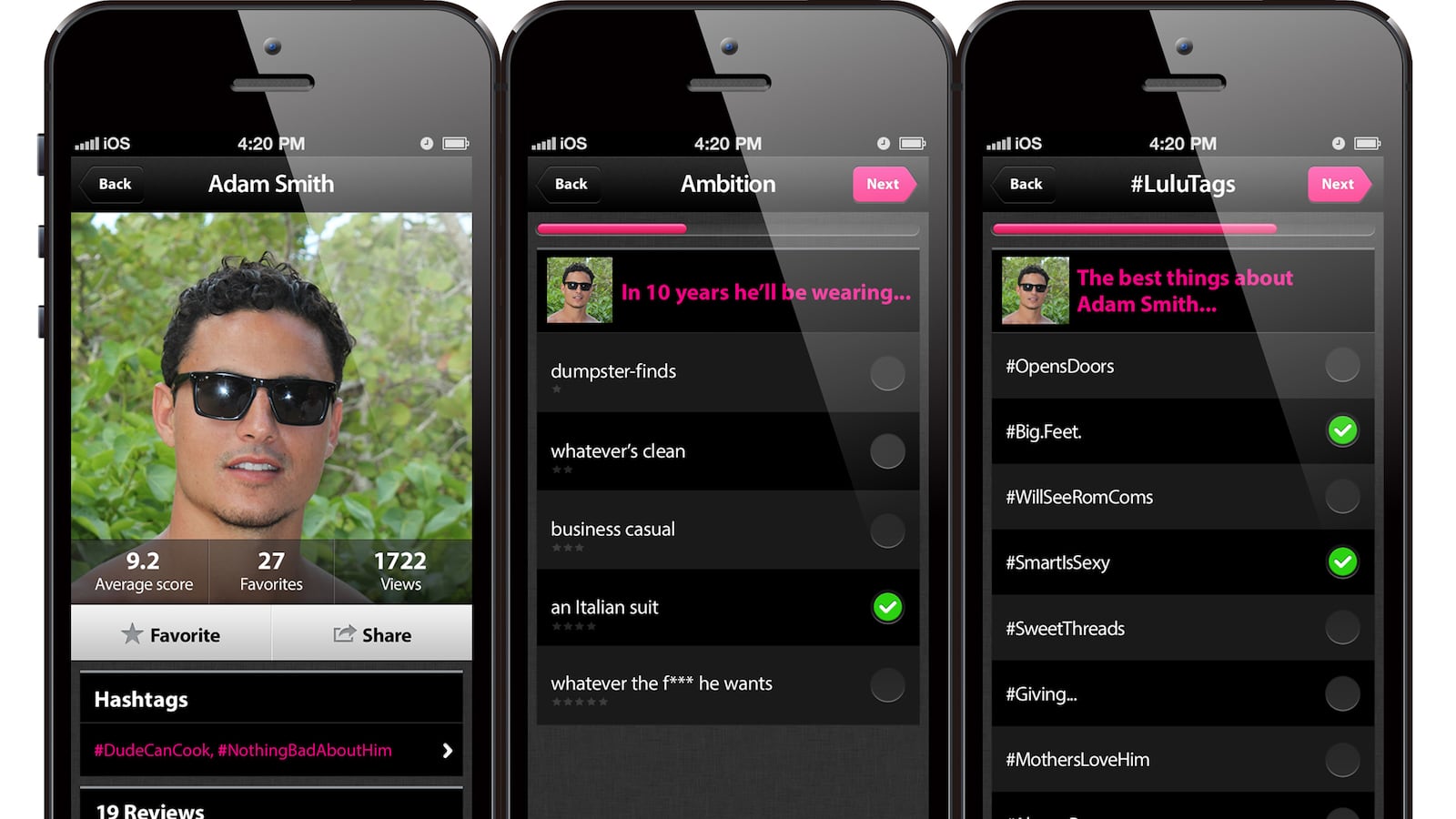Last spring, Ellie Claxton, a 19-year-old freshman at Auburn University, entered a contest. The $200 winning pot was, as she put it, “easy money,” so she thought, “Why not?”

But what she had to do was less than ordinary: she was asked to rate her male friends using a new iPhone app called Lulu. The first girl to rate 300 guys on the app won the prize money. Claxton quickly began rating her Facebook friends—guys she knew—and then broadened, reviewing guys that been selected for her at random. As part of the process, she assigned each guy hashtags pre-chosen for her by Lulu. They ranged from positive descriptors—such as “#WritesLoveSongs” and “#CanTalkToMyDad”—to the more negative: “#ManChild,” “#OwnsCrocs,” “#WanderingEye,” and “#NoGoals.”
Saying it took her “less than 30 seconds” to rate a guy, Claxton whipped through the required 300 ratings in less than a week—and took home the prize money.
Lulu, now seven months old, is rapidly gaining popularity. Using the app, girls can anonymously rate and review their male Facebook friends, as well as men they don't know, completely anonymously. Reviews allow girls to note whether they were “together” with the guy, whether he was an ex-boyfriend, a “hookup,” a crush, or just a friend. Like an old-fashioned Cosmo quiz, the app asks girls to finish sentences about the guy they’re reviewing. “He really ought to return the call from… (a) his probation officer; (b) his dealer; (c) his boss; (d) his Ferrari dealer; or (E) Richard Branson.” Girls are directed through several pages of this until they are asked to assign the guy a series of pre-decided adjectives.
The app launched in February and now boasts 1 million users—all of whom are girls, and most of whom are between the ages of 18 and 24. Since Lulu began, it has seen 200 million profile views, and according to Appdata.com, the app now ranks 53rd out of 400 free iPhone apps in the social-networking category.
Lulu’s co-founder and CEO, Alexandra Chong, 32, says she came up with the idea for the app while having lunch with girlfriends on Valentine’s Day three years ago. “Here we were, a bunch of 20-something women. Not everyone knew each other, but it was a safe environment because it was just us girls,” she says. Her mission for Lulu, she says, is to “tap into the power of girl talk”—specifically “that moment when girls get together in a safe environment and help other girls make smarter decisions.” Chong and her co-founder, Allison Schwartz, 35, run Lulu out of New York and London.
Because of the nature of the app—and the teeny, twangy language it employs—Lulu unsurprisingly targets girls on college campuses. The creators have launched several contests similar to the one Claxton won last spring, offering money in exchange for reviews and also soliciting people to get others to download the app. The contest model, as well as appointing girls to serve as on-campus “agents,” has helped the app gain a stronghold with college users. It’s been so successful that The Wall Street Journal deemed it an ingenious “sorority strategy.”

Men are also starting to catch on to the fact that there now exists performance reviews of their behavior on an app—a sort of secretive, girls-only version of Consumer Reports. And apparently, some guys are liking the attention: according to the founders, half a million men have sent requests to have themselves reviewed by girls on Lulu. Talk about masochism.
“I’ve heard guys be like, ‘Will you log on and give me five stars?’” says Lucy Williams, 20, a rising junior at Bucknell, where she is one of Lulu’s on-campus “agents.” “Guys can be pissed when they have heard they haven’t gotten ratings. It’s anonymous, so guys are probably thinking, ‘I better think twice before I do certain things.’”
The app may not be welcomed by all guys, but it’s clear that Lulu arms girls with some sort of new power by word-of-mouth. (After all, there’s a constant threat of a bad review.) But it’s hard not to wonder if, in some small way, Lulu isn’t just an evolved form of sexism. Girls can anonymously call a guy a “#TrustFundBaby” or “#MamasBoy.” Couldn’t those adjectives be hurtful? Not to mention that the reviews are expressed as a review out of 10. What if someone scores a 3? Consider, for a minute, how different it would be if the roles were reversed—and if only guys used the app to rate girls. The Huffington Post said the app “Lets Women Review Men Like Restaurants,”, and one writer for The Daily argued: “Lulu pretends to empower women, but instead it allows women to defame men and conform to stereotypes in the process. Undoubtedly, Lulu is a form of cyberbullying.”
But Chong says the founders have been careful to keep Lulu from being too mean about guys. “We are taking it into consideration what we as women want to know—but we want to be cautious and mindful that it might be slightly hurtful to someone else,” she says. “It’s more of a positive place than a negative place. Once guys understand it better, they see it as a secret weapon to engage and use to their advantage.” She adds: “People who don’t understand how Lulu works may say [it’s sexist]. But we are taking real-world experience and using the technology out there today to harness that.” (Guys are able to remove themselves from Lulu.)
Next, she says, Lulu will to expand into health and beauty. Though the founders haven’t disclosed details on how they’ll adapt their pre-existing product to either space, Chong says she’s interested in continuing the idea of Lulu “as a private place where women can share.”






